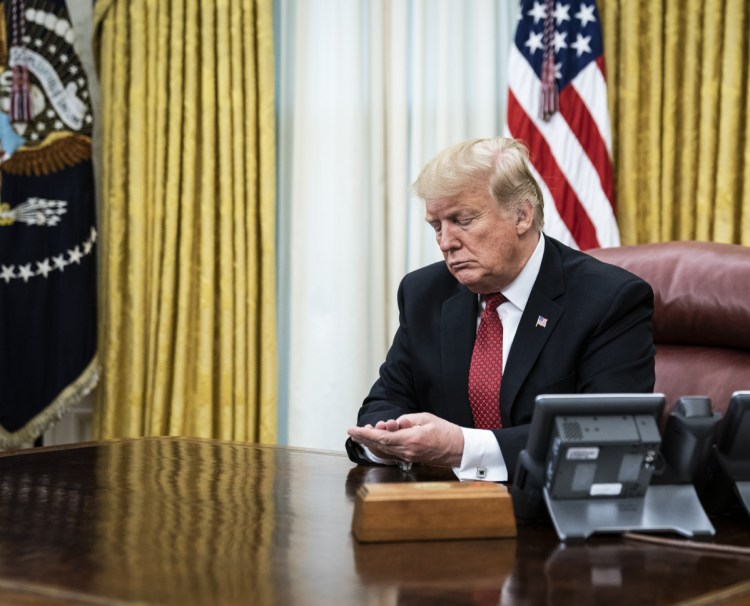WASHINGTON — When President Trump delivers his annual State of the Union address Tuesday, a Democrat will be seated at the rostrum over his shoulder for the first time.
The presence of House Speaker Nancy Pelosi, D-Calif., will bring into fresh relief not only the power shift in the Capitol, with the opposition party now able to thwart the president’s agenda, but also the converging pressures on Trump that have brought his presidency to a crossroads.
Trump dealt himself a political defeat with the 35-day government shutdown. He has secured no funding to construct a border wall and is preparing to declare a national emergency to fulfill his campaign promise. He is newly at odds with the nation’s intelligence chiefs and some senators in his own party. The Russia investigation, which has ensnared several of the president’s allies, appears to be nearing its conclusion. New congressional oversight investigations will start soon. And the race to defeat him at the ballot box has kicked off in earnest.
“This is a watershed moment,” said Chris Whipple, author of “The Gatekeepers,” a history of White House chiefs of staff. “Time is running out. This is a last chance to really get things right.”
The challenges mount at a moment when Trump is as unencumbered and isolated as ever. Inside the White House, aides describe a chaotic, freewheeling atmosphere reminiscent of the early weeks of Trump’s presidency.
Power has consolidated around presidential son-in-law Jared Kushner, a senior adviser who is functioning as a de facto White House chief of staff. With counterweights like ousted chief of staff John Kelly now gone, some advisers say the West Wing has the feel of the 26th floor of Trump Tower, where an unrestrained Trump had absolute control over his family business and was free to follow his impulses.
Mick Mulvaney, who has replaced Kelly in an acting capacity, has said he is trying to manage the staff but not the president, according to administration officials. He has told friends that he shuttles in and out of the Oval Office and meets alone with Trump twice a day – once in the morning and once in the evening, for about 15 minutes each. Asked at a recent dinner whether he was acting as a gatekeeper, Mulvaney laughed and said, “I’m not trying to stop him from doing things,” according to the officials.
Trump’s popularity, meanwhile, is at an ebb. Polls show many more Americans blame him for the shutdown than Democrats, and growing majorities disapprove of his job performance – despite Trump’s stewardship of a robust economy and his declared intentions to withdraw U.S. troops from unpopular foreign wars.
This raises the question of whether Trump on Tuesday might use his annual address to a joint session of Congress – and to a prime-time national television audience – to make a course correction and seek to expand his appeal or to burrow in on conflicts with the opposition party, chiefly over illegal immigration and border security.
Trump said last week that his “State of the Union” would be about “unification,” but that theme belies the president’s combative instincts and the indifference – even hostility – he has shown toward congressional negotiations.
“He may mouth bromide of national unity, but if he points to people in the gallery and says, in effect, immigrants of color are coming to kill you, that would undermine whatever pretense,” said Michael Waldman, who as chief White House speechwriter helped pen President Clinton’s State of the Union in the wake of two government shutdowns between 1995 and 1996.
“At other points, presidents facing dropping poll numbers have chosen to be very conciliatory or very optimistic,” Waldman said. “That would surprise everyone here. I don’t know that it’s in Trump’s repertoire. When he does it, it feels like he’s reading under duress from the teleprompter – and everybody knows when he gets back to the White House, he’ll start tweeting again.”
Although the fight for a border wall has been a chief focus of Trump’s for the past two months, the president’s advisers said his address would not be an immigration-centric jeremiad, but rather would set a governing agenda for the year ahead. For instance, Trump plans to talk about infrastructure development and prescription-drug pricing, two issues with broad bipartisan appeal, according to a senior White House official.
The president also is expected to talk about foreign affairs and highlight his administration’s recent moves in Venezuela.
Copy the Story LinkSend questions/comments to the editors.



Success. Please wait for the page to reload. If the page does not reload within 5 seconds, please refresh the page.
Enter your email and password to access comments.
Hi, to comment on stories you must . This profile is in addition to your subscription and website login.
Already have a commenting profile? .
Invalid username/password.
Please check your email to confirm and complete your registration.
Only subscribers are eligible to post comments. Please subscribe or login first for digital access. Here’s why.
Use the form below to reset your password. When you've submitted your account email, we will send an email with a reset code.